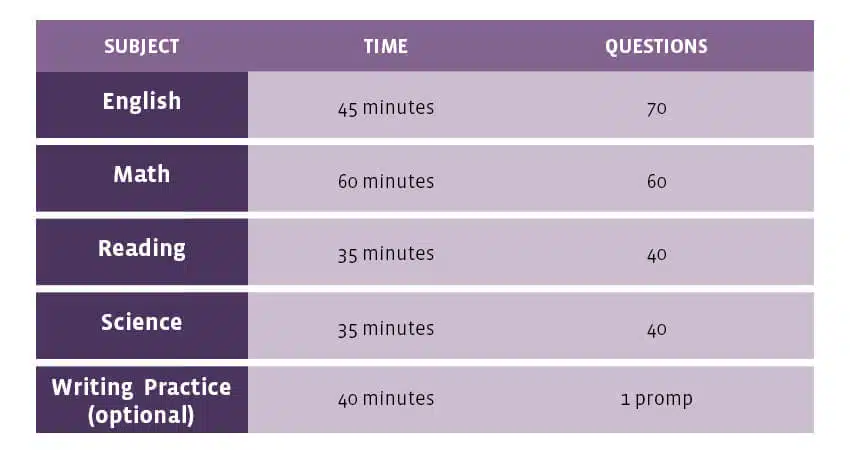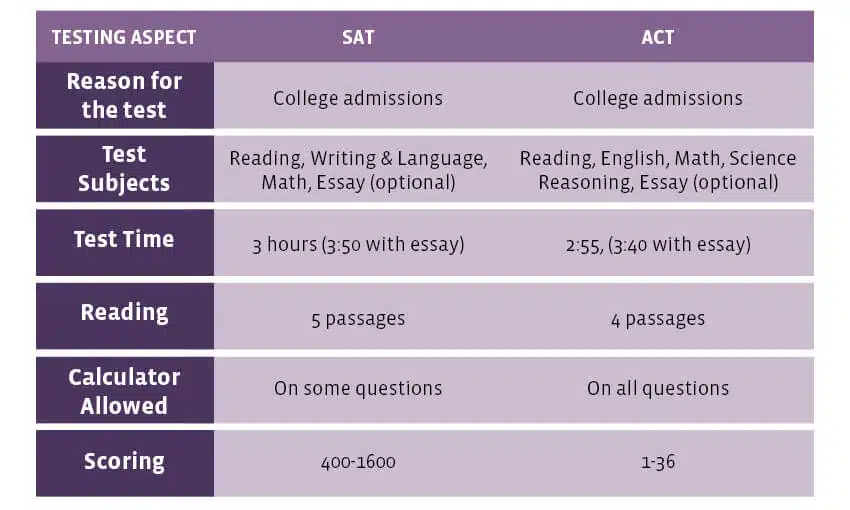What Is The ACT Test? Here’s All You Need To Know
Updated: June 19, 2024

If you’re seeking to earn your higher education degree, you have probably put together a list of schools that you are interested in attending. It’s also very probable that when looking up their application requirements, you’ve come across the acronyms SAT or ACT. So, what is the ACT test? And how is it different from the SAT test?
Let’s break down everything you need to know about taking the ACT and why you would need to do so.

Photo by Anastasiya Gepp from Pexels
What Is The ACT Test?
The ACT is a college entrance exam. The acronym stands for American College Testing.
The ACT is used by college admissions committees to help gauge a student’s readiness for college-level material. Along with other admissions requirements — like GPA, extracurricular activities, and letters of recommendation — the ACT score is used to select which students get accepted into a university.
Depending on the college you’re applying to, the importance of one’s ACT exam score may vary. ACT, Inc. administers the test.
Who Is The ACT Test Designed For?
The ACT should be taken by high school students who are interested in applying to a college that requires the test. It is designed for students in 10th, 11th, and 12th grade.
When Do I Take The ACT?
There’s a lot of options for when to take the test! However, most students choose to do so during the spring in their junior year or in the fall of senior year. This way, if you need to retake the test, you have enough time to do so and receive scores back before applying to college.
The ACT is administered in September, October, December, February, April, June, and July, with some exceptions for certain states.
What Is On The ACT?
If you plan to take the ACT, it’s best to know what is on the test. The ACT is broken into four sections:
- Reading
- English
- Math
- Science
The most noticeable difference between the SAT and ACT is the fact that the ACT includes science, whereas the SAT does not.
Like the SAT, the ACT has an optional Writing Test that is 40 minutes long. While some colleges require the Writing Test, others may not. So, before you sign up to take the ACT, be sure to check the requirements of your desired colleges.
How Long Is The ACT Test?
The ACT is 2 hours and 55 minutes (which is slightly shorter than the SAT). If you opt into the essay, then it becomes 3 hours and 35 minutes. When taking both sections of the test, the scores are supplied separately.
Here is the breakdown of how much time you have and the total number of questions per section:
ACT Scoring: How It Works And What The ACT Measures
The ACT is scored on a point scale out of 36. Each section receives a score of 1-36. Then, the composite score is calculated by taking the average of four sections on a scale of 1 to 36.
You may be wondering, “What is the average ACT score?” In 2019, the average composite score was 20.7, which is a decline from the prior year of 20.8.

Photo by Alissa De Leva on Unsplash
How To Do Well On The ACT
To prepare for the ACT, you should follow the kind of studying routine that works best for you personally. However, a few good tips and tricks include:
- Be Consistent: Study consistently for a few months before the exam so that you have time to learn and improve weak spots
- Find Weak Spots: When you take practice tests, you can notice where your weak spots are so that you can spend more time refining your understanding in weaker subject matter
- Practice: Take practice exams online
- Avoid Careless Mistakes: Take time to read directions carefully and avoid careless mistakes
Test Prep / Online Prep
There are many resources, both offline and online, to help prepare you for the ACT exam. These include resources that are specifically designed by ACT, Inc. To find out more about resources for test prep, visit ACT, Inc’s resources.
Fast Facts: Things To Know
- All four-year universities in America accept ACT scores
- The questions are directly related to what students learn in high school
- In 2018, 1.9 million students took the test from all 50 states
- International students who want to attend schools in America take the ACT, too
Should I Take The ACT Or The SAT?
One of the most common questions that high school students have when facing standardized testing is which to take — the ACT or the SAT. Many students take both.
However, they do cost money and take time to study for. So, if you are trying to pick between one or the other, try to take a practice test of each. See which format you prefer and feel more confident with. An important distinction between the two is that the ACT includes science, but the SAT does not.
Here’s a quick and easy chart to help you compare the two:
ACT Vs. My GPA: What Matters More?
When applying to college, there are a lot of factors that admissions committees consider. While the ACT is certainly important, it does not stand alone to tell the story of the kind of student and person you are.
However, the ACT is highly coveted by admissions committees to understand how prepared you are for college. Since the ACT is nationally administered, but high school curricula may vary by state, the ACT is used to judge students more “fairly.”
Additionally, if two students have the same GPA, then the ACT may be considered even more so for which student should be accepted.
On the other hand, some colleges do not require the SAT or ACT at all. For example, the University of the People is online and tuition-free with less requirements than most colleges. We believe that every student, regardless of circumstance, should have the ability and right to earn their education. That’s why the main requirements for admission to the University of the People is a high school diploma or proof of completion and English proficiency. To find out more, check out our program offerings!
The Wrap Up
If you’re applying to a traditional four-year university in America, it is more likely than not that you will have to take either the SAT or ACT test. When preparing for the exam, be sure to use online resources and take practice tests. If you have the opportunity to create study groups or attend specific tutoring courses, then that is also advisable.
Remember, if you need to take the test again, you can, but you’ll want to take the first attempt early enough so there’s time to receive your score before college applications are due!




